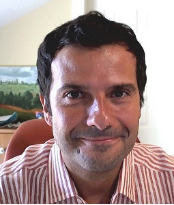报告题目:Engineered earth masonry for sustainable hazard-resistant houses
报告人: Fabio Matta 美国土木工程师协会 (ASCE) 期刊《建筑复合材料》主编
报告时间:2024年4月7日(周日)10:00-12:00
报告地点:致工楼 A431报告厅
报告人简介:

Prof. Matta is a tenured associate professor in the Department of Civil and Environmental Engineering at the University of South Carolina, Columbia. He was educated at the University of Padova, University of California, San Diego, and Missouri University of Science and Technology. His group does research on construction materials and their structural performance, ranging from affordable earth masonry to advanced cement- and polymer-matrix composites. Prof. Matta is a voting member of ACI Committee 241 (Nanotechnology of Concrete), 440-0H (FRP-Reinforced Concrete), and Joint ACI-ASCE 446 (Fracture Mechanics of Concrete). He serves as the editor-in-chief of the ASCE Journal of Composites for Construction.
报告内容简介
Earth masonry made of compressed and stabilized earth blocks, which are formed in a press using soil, water, and a small amount of stabilizer such as ordinary Portland cement, is a sensible option for affordable, durable, and locally appropriate dwelling structures. In particular, thermal efficiency and humidity control capabilities have prompted the use of earth masonry in developed countries. However, the limited and mostly anecdotal understanding of structural behavior, together with misconceptions on durability, often contribute to the perception of this material as a substandard choice. This presentation aims to demonstrate how science and engineering make it possible to create earth masonry that retains its “green” features, and is also suitable for affordable dwellings that can resist extreme loads imparted by tornado winds and flying debris. First, strength targets are established based on the analysis of a representative one-story dwelling structure. Second, a masonry system that meets the strength targets is prototyped using local South Carolina soil and 6% of Type I cement in weight of soil. Third, the damage tolerance of the prototype masonry is transformed by incorporating non-biodegradable recycled plastic reinforcement. Proof-of-concept is demonstrated by means of impact tests, in conformance with US code requirements for community and residential safe rooms.